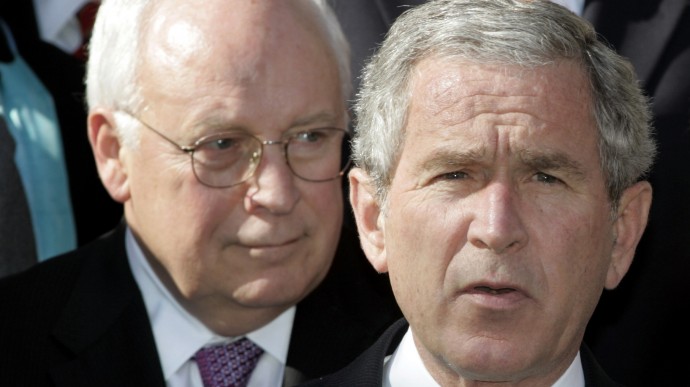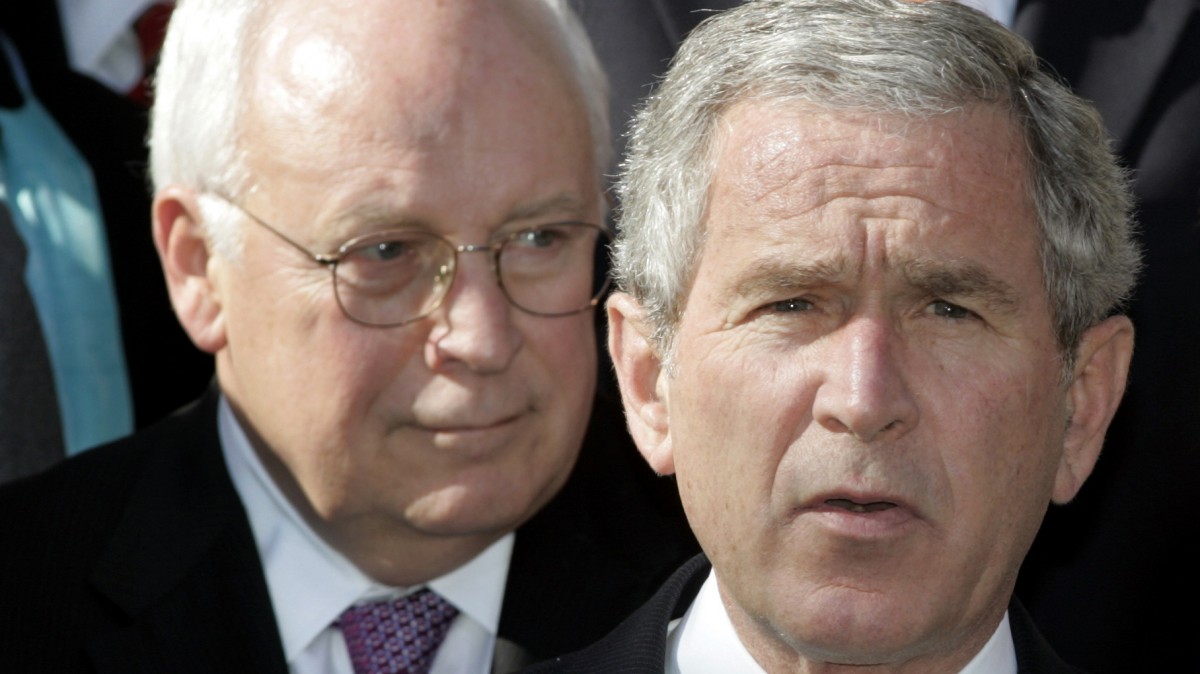
(MintPress)–Former President George W. Bush and Vice President Dick Cheney are not likely to enjoy the famous beaches of Malaysia any time soon, as the two former leaders have officially been labeled as war criminals following a court’s decision to convict them on torture charges in absentia. Traveling to the country means the two Americans risk arrest.
Bush and Cheney were found guilty Friday, along with former Defence Secretary Donald Rumsfeld, former Attorney General Alberto Gonzales and the administration’s legal advisers, of torture — a violation of the Geneva Convention, of which the U.S. is a party. The trial, which included victim testimony, lasted for one week, ending in an unanimous ruling by a five-member tribunal of the Kuala Lumpur War Crimes Commission.
The trial heard from witnesses who alleged torture at the hands of American forces in Abu Ghraib and Guantanamo Bay — all witnesses had been released by U.S. forces. A 48-year-old Iraqi engineer testified against the Bush administration, claiming his fingernails were removed by pliers, among others with similar scale accusations, according to the Foreign Policy Journal.
The Malaysia incident doesn’t highlight the first time Bush has had to limit his global travel scope. In 2011, on his way to speak at a Jewish gala in Geneva, Switzerland, the former president was advised to call off his trip due to pending torture charges. Traveling to the country puts Bush at risk of arrest.
The trial
American lawyer and international law professor Francis A. Boyle was a member of the prosecuting team in Malaysia. Having authored several books focusing on international law and American foreign policy, Boyle is considered to be an expert in his field, and a harsh critic of American policy.
In an interview with Foreign Policy Journal, Boyle seemed optimistic that the ruling in Malaysia would be heard throughout the world, particularly after the failure to persuade other countries to hold similar trials. Boyle argues that America is subject to international law, and should therefore be held to that standard. However, he acknowledges that such a venue for conviction under international law is hard to come by.
“We tried three times to get Bush in Canada but were thwarted by the Canadian Government, then we scared Bush out of going to Switzerland,” he said. “The Spanish attempt failed because of the government there and the same happened in Germany.”
The conviction is a continuation of a 2011 hearing, in which the Tribunal convicted former United Kingdom Prime Minister Tony Blair and Bush for Crimes Against Peace — charges that hold in Malaysia, but are not recognized throughout the international community. The court first received complaints of torture in 2009, leading to the creation of the tribunal.
The court was modeled to follow the regulations set forth by the Nuremberg Charter, established in 1945 following the atrocities inflicted by Nazi Germany in WWII, as a military tribunal for the conviction of war crimes.
The charter establishes a trial in which defendants are subject to the decisions of a tribunal, rather than a jury. Testimony from witnesses and cross examinations among the defendants and plaintiffs is permitted. The U.S. is technically a party to the tribunal, but the UN declares who will be tried — a move that is unlikely to subject a powerful member nation to its jurisdiction.
Boyle’s team of witnesses included Ali Shalal, who claimed he had been hung from a wall while being electrocuted simultaneously. A British man, Moazzam Begg, who spent time in Guantanamo Bay, and Jameelah Abbas Hameedi, a woman who was allegedly tortured in Abu Ghraib prison, were also among the witnesses. Hameedi told the court she was stripped and used as a human shield by American forces.
Following in line with the Nuremberg Charter, the Malaysian case allowed for the defendants to conduct their own defense — but the likelihood of foreign American leaders and their legal advisors to voluntarily travel to Malaysia and defend themselves was always slim. Therefore, they did not produce a defending argument.
Bush has, in the past, admitted American forces used torture, specifically waterboarding, as a method to extract information from people who were picked up as alleged terrorists. Retired Army Major General Antonio Taguba claimed America used torture in the form of electrical shocks, sexual humiliation and beating in Iraq, Afghanistan and Guantanamo. His findings were detailed in the Taguba report, which provides detailed information on torture in Abu Ghraib and other American military prisons.
Attempts have been made to try Bush in American court, but have fallen short. Experts say the process would be very time consuming and doubt that the government would allow such proceedings to go forward.
Those within the administration defend the use of torture as necessary to combat terrorism — those opposed see it as adding fuel to the fire, especially in cases where innocent people are subject to torture.
Global impact of conviction
The conviction will now be sent by the Malaysian government to the International Criminal Court (ICC) and the United Nations Security Council. The United States is not a party to the ICC, a move that protects its citizens and leaders from mandatory trial and sentencing through the court. Malaysia last year signed the Rome Statute, binding the country to the ICC. Considering the United States’ power and presence within the UN Security Council, it is doubtful the Malaysian decision will incite action to try the former American leaders in the International Military Tribunal.
It does, however, draw attention to the issue — and emits a very loud statement on behalf of Malaysia. The tribunal itself was hurried along by former Malaysian Prime Minister Mahahir Mohamad, a staunch critic of the war in Iraq. In 2011, Mohamad was behind a tribunal that found former United King Prime Minister Tony Blair and Bush guilty of genocide — another ruling that put Malaysia’ stance toward Western policy in place, but did little to impact the lives of Bush and Blair.
The U.S. holds strong to sovereignty, which means Bush and Cheney are not likely to ever face a binding conviction for war crimes, as they are only legally held accountable in U.S. courts.
Convictions around the world, however, could limit their ability for travel freedom and create a dialogue among nations, which may look to hold world leaders accountable for actions they try as contrary to international law. As news of Bush and Cheney’s torture conviction made its way around the world, speculation began on whether President Barack Obama would also be subject to such convictions, given alleged ongoing torture and civilian air strike campaigns, most notably in Libya.


